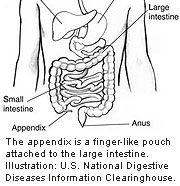
THURSDAY, April 5 (HealthDay News) — For people suffering from uncomplicated appendicitis, a course of antibiotics may be just as good as having the appendix removed, British researchers report.
The researchers reviewed studies involving hundreds of patients to determine that treatment with antibiotics could be a safe alternative to surgery, which has been the so-called “gold standard” of care for an inflamed appendix since 1889.
“Starting antibiotics when the diagnosis of uncomplicated acute appendicitis is made, with reassessment of the patient, will prevent the need for most appendectomies, reducing patient morbidity,” said lead researcher Dr. Dileep Lobo, professor of gastrointestinal surgery at the University of Nottingham and Queen’s Medical Centre.
Antibiotics also can shorten a patient’s hospital stay, he added.
Since better diagnostic tools are now available to diagnose appendicitis, it is safe to adopt a careful “wait, watch and treat” policy for those who have uncomplicated appendicitis or when the diagnosis is uncertain, Lobo said.
“In these patients, correct diagnosis rather than an early appendectomy is the key,” he said. But, he added, “for patients with clear signs of perforation or peritonitis (an inflammation of the abdominal wall), early appendectomy still remains the gold standard.”
For the report, which is published in the April 5 online edition of BMJ, Lobo’s team did a meta-analysis of four studies in which at total of 900 patients with appendicitis were randomly assigned to surgery or antibiotics.
Among patients treated with antibiotics, 63 percent did not need any further treatment after a year. In addition, antibiotic use resulted in 31 percent fewer complications than surgery, the researchers found.
Among the more than 400 patients treated with antibiotics, 68 had recurrent symptoms. Of those, 13 had serious appendicitis, four had a normal appendix and three were successfully treated with more antibiotics, the researchers noted.
The researchers also found no real differences in the length of hospital stays or the risk of complicated appendicitis between people treated with antibiotics and those who underwent surgery.
Dr. Rodney Mason, an associate professor of surgery at the University of Southern California Keck School of Medicine in Los Angeles, reported similar findings in his own study in the February issue of the journal Surgical Infections. “Antibiotic therapy offers a risk of complications that is significantly less than that of appendectomy,” he said.
But patients must be willing to accept the idea that they may have to return for surgery if symptoms recur, he said.
“Patients must be willing to accept an initial failure and subsequent recurrence rate of about 40 percent in exchange for the possibility of foregoing surgery and its associated risks,” Mason said. “Having said that, 60 percent of patients will get by without surgery.”
“Conservative treatment with antibiotics seems to do better than appendectomy,” said Dr. Olaf Bakker, from the University Medical Center Utrecht in the Netherlands and the author of an accompanying journal editorial.
He noted in his editorial, however, that appendectomy does not have a lot of complications, while the researchers found that antibiotic treatment resulted in a 20 percent chance of recurrence within a year.
“Of these recurrences, 20 percent of patients presented with a perforated [appendix] or gangrenous appendicitis,” he said. “It is questionable whether a failure rate of 20 percent within one year is acceptable.”
These results therefore should be interpreted with caution, he said, and appendectomy “will probably remain the treatment for appendicitis until further studies are done.”
One other expert noted that the choice is a complicated one, and part of that involves the costs of each treatment.
Although antibiotics may be cheaper, if patients need to come back for an appendectomy after antibiotics have failed, the total cost might end up being higher, said Dr. Carl Schulman, an associate professor of surgery at the University of Miami School of Medicine in Florida.
In addition, doctors influence a patient’s decision by what they say, he added.
“You could say, ‘With antibiotics, there is a four-in-five chance that you won’t need an operation.’ That seems very reasonable,” he said. “But you could say, ’20 percent of patients do come back after antibiotics and they have to have their appendix out; maybe we should just take out your appendix.'”
The best a patient can do is make an informed choice by asking questions, Schulman added.
More information
For more on appendicitis, visit the U.S. National Library of Medicine.

